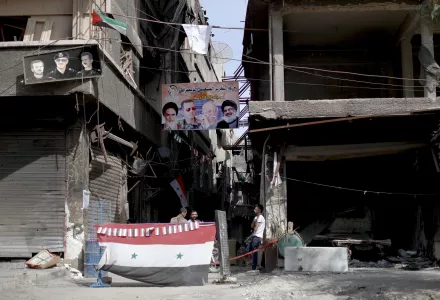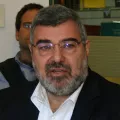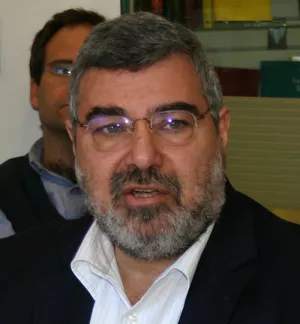
BOSTON — The announced abrupt U.S. withdrawal from Syria has sparked widespread speculation about what we might expect next, with most U.S.-based analysts emphasizing the “who wins and who loses” approach to their conclusions. This is understandable in a society whose foreign policy is heavily mercantile, self-centered, militaristic, and absolutist in its strategies and tactics, but it misleads the public that listens to such narrow views.
I am watching the American political mainstream analyze Syria and the region while I also closely follow my other love in the USA: college and professional sports. I am troubled to see identical approaches to Syria analyses and to discussions about what happens in the National Football League playoffs or college basketball rankings. When a leading player is injured or a powerful team slumps for a few weeks, the sports analysts suggest and explore endless possibilities about what might happen, and which teams will win or lose from the changed circumstances on the playing fields.
But Syria analysts diverge from the high-quality American sports coverage tradition in two critical ways: The sports analysts are experts who genuinely know their material, and also analyze events dispassionately. Syria analysts usually exhibit much less genuine expertise and far more ideological bias about the implications of the U.S. pullout. The American mainstream media and political tendency to discuss Syria like one covers college sports is among the destructive American deficiencies and foreign policy mistakes that have been repeated and aggravated over decades.
Anyone interested in anticipating Syria developments and their wider Levant/West Asia region should pay attention and grasp events in the same way that we analyze a four-way trade in professional baseball or basketball — one of the most exciting, sophisticated, and meaningful dimensions of American sports. Multi-team trades are deeply negotiated, attentive to the desires of several parties, and lead to a win-win situation that strengthens all the teams, according each one’s self-defined priorities.
Syria now is a rich landscape of power politics in which at least 13 big and small actors seek to strengthen their position and minimize their weaknesses — a 13-way potential confrontation that could also end up being a 13-way negotiated tradeoff that achieves the minimum needs of all, or most, parties.
The 13 parties I identify include the six most powerful ones (the U.S., Syria, Turkey, Iran, Russia, and Israel), and seven weaker ones (Iraq, Jordan, Lebanon, Hezbollah, Saudi Arabia, assorted Kurdish groups, and the Islamic State remnants), along with other interested parties like the United Arab Emirates, France, Qatar, Egypt, and Syrian and Iraqi tribal forces.
This constellation of actors has started to negotiate with one another to achieve their desired results — just as serious sports teams negotiate with three or four others simultaneously to fill in gaps in their rosters and trade away players who are not essential to their success.
This repeats the dynamic that defined the war in Syria during the past eight years, in a fracturing, evolving, Middle East: Power flows from a coalition that includes, typically, one or two foreign powers, Arab states/governments, non-Arab regional powers, and Arab and non-Arab non-state actors with clout. So the Russia-Syria-Iran-Hezbollah coalition triumphed in the very costly war in Syria, while the U.S.-Turkey-Saudi Arabia-Syrian rebels coalition essentially lost. Others in between (Israel, assorted Kurds, Islamic State, tribal groups, Jordan) gravitated to one side or the other as conditions demanded for their wellbeing. Other such coalitions are engaged in the Saudi-Emirati-led war against Yemen.
I assume that these 13 parties will not deliberately choose to start new wars in this exhausted region, but instead will try non-violently to emerge from today’s transforming era in solid and safe condition. All parties will define the minimum needs that they will seek to achieve through a combination of secret talks, saber-rattling, open bilateral diplomacy, and endless multi-lateral consultations.
Will Russia-Turkey-Iran and allies be the dominant power that calls the shots? Will a new combine of Russia-Israel-Saudi Arabia emerge, or one that sees Israel-Russia-Turkey working more closely together? What of the Turkey-Qatar-Iran group that is becoming a regional player in some arenas? Will the Kurds find protection and an autonomous but normal life as part of a reconstituted Syrian state, which will assuage Turkish fears of a strong, state-like Kurdish entity? And what of the Syrian state itself, and its configuration and interests?
If you have ever been impressed by the central bazaars in the capitals of Turkey, Iran, and Syria, you should now pay attention to the political haggling, bluffing, table-banging, raised eyebrows, threats, walk-outs, sweet talk, feigned disinterest, serial tea offerings, troop redeployments, and other essential elements of the negotiations that will now take place in and around Syria. This will likely result in no absolute winners and losers, but rather might formalize power relations that were created since 2011 by actors who understand the nuances and pragmatic negotiating positions needed to survive, in the first instance, and then to thrive in the longer run.
They do this by giving and taking, in discussions with their foes and allies. The critical three elements for success in such a dynamic are: knowing precisely your real national self-interest, what you must obtain, and what you can give away. The United States, almost uniquely in the world of culture and diplomacy, is alien to this ancient craft of political bazaar negotiations, because it has not defined its genuine national interests in the Middle East after the Cold War, and prefers the tools of threats, sanctions, wars, and other destructive, usually ineffective, unilateral action.
Washington is moving its troops out of Syria, but still has significant indirect influence if it wishes to use it. To do so, it must figure out how to engage in this great transcontinental negotiation over Syria that is already underway. Four-way sports trades are really complicated, but Americans mastered that skill decades ago. This is an opportunity for Washington to make the effort to apply this negotiating skill in global politics, so that it stops wasting trillions of dollars and its squandered cultural goodwill, leaving behind destroyed lands — the way it has done for decades in the Middle East and Asia.
Rami G. Khouri is senior public policy fellow, adjunct professor of journalism, and Journalist in Residence at the American University of Beirut, and a non-resident senior fellow at the Harvard Kennedy School’s Middle East Initiative. He can be followed @ramikhouri
Copyright ©2018 Rami G. Khouri — distributed by Agence Global
Khouri, Rami. “Understanding Syria Today is Not Baseball…or Is It?.” Agence Global, December 21, 2018


